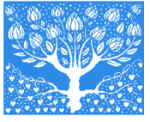| Compassion Autumn 2000 | |
| Madeline Ko-i Bastis
Compassion is a pleasant quivering of the heart in response to pain.
Generosity is a willingness to give, without pious motivation and not being afraid of receiving anything. |
Those of us who
are caregivers like to think of ourselves as compassionate people. We
devote our lives to helping others and often derive great satisfaction
from giving to those who are in need. When that satisfaction wanes and we
become a little colder, a little bitter, a little needy itís time to look
at ourselves and our definition of compassion. In Buddhist psychology there are three levels of compassion - the first is tied to a specific situation or person - there is drought and whole villages starve; a friend loses a husband to cancer; our mother is diagnosed with Alzheimerís. Our hearts are touched and the desire for suffering to end arises. We want the person to get well, the situation to change or we want not to feel sad and helpless. Frequently this kind of compassion causes suffering in ourselves. We become caught up in the pain of the other and it reminds us of our own pain. During the first year of my chaplaincy training I worked on a medical floor of a large cancer center. During that year 83 people that I had gotten to know died. I experienced chronic leg pain, exhaustion, insomnia and long bouts of weeping. Immersing myself in my patientsí suffering cracked my carefully constructed shell of denial of my own suffering. It took several months for me to be willing to ask for help in confronting my own emotions and issues. Even though I had several years of meditation practice behind me, it was difficult to stay with the feelings and accept them. When this kind of suffering rears its ugly head the temptation is to flip-flop in the other direction - constructing, brick by brick, a wall of indifference to protect ourselves from feeling any pain - our own or anotherís. But there is another way. In Buddhism, compassion is defined as a pleasant quivering of the heart in response to suffering. How strange that sounds to us! We tend to think that if a person doesnít cry or get upset that they donít care. But a sense of detachment is necessary if we really wish to help another. Imagine if we were on the operating table and the surgeon started to cry, patted us on the shoulder and became so overwhelmed with feeling that she couldnít work. We can work with the conflicting emotions of drowning in pity or indifference to suffering by practicing a meditation call Karuna (compassion) which is the companion practice of Metta (loving-kindness). Like Metta, we visualize the person to whom we are sending compassion and work with the phrases: May you be free from pain. May you be free from suffering. May your heart be filled with peace. If we tend to close ourselves off from feeling, we can use the phrase: I care about your pain.Both of these practices help bring us into balance so that we can act
compassionately. We begin to realize that everything changes: we are born,
we live, we become old and sick and then we die. We exacerbate the pain of
change by clinging to the pleasant and pushing away the unpleasant. When
we understand this truth, the vast expanse of suffering in which we all
dwell is revealed and we feel compassion for all beings. This is the
second level. |

